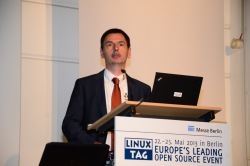LinuxTag: LiMux firmly established in Munich

Peter Hofmann, the leader of Munich's Linux migration project, has denied rumours that the LiMux client![]() will be "decommissioned" when the initiative runs out at the end of the year. "The City of Munich has no intention to switch", he said at the LinuxTag conference in Berlin on Wednesday. The basic instruction given by Munich's City Council in 2003 was to create more independence and autonomy for Munich's IT, said Hofmann. This task won't be completed when the project runs out in October, he explained, adding that further adjustments will be needed in the specialised application and server areas.
will be "decommissioned" when the initiative runs out at the end of the year. "The City of Munich has no intention to switch", he said at the LinuxTag conference in Berlin on Wednesday. The basic instruction given by Munich's City Council in 2003 was to create more independence and autonomy for Munich's IT, said Hofmann. This task won't be completed when the project runs out in October, he explained, adding that further adjustments will be needed in the specialised application and server areas.
According to the project leader, the scheduled migration of 80 per cent of Munich city administration's around 15,000 workplaces was completed last November, and 14,200 computers now use the LiMux client and OpenOffice. Hofmann said that the principles developed in the course of the project include that systems should be "migrated over time" rather than in a "big bang", and that the idea was to "make rather than manage", meaning that any missing tools should be developed by the project itself. In line with the initiative's sustainability policy, these tools are now being integrated into an open source strategy that the project is still working on.

![]() Peter Hofmann, the leader of Munich's Linux migration project, at LinuxTag 2013
Peter Hofmann, the leader of Munich's Linux migration project, at LinuxTag 2013
Source: Stefan Krempl
Hofmann said that, looking back, it was fortunate that a coalition between the Social Democrats (SPD) and the Green Party (Bündnis 90/Die Grünen) was in power in Munich for the project's entire duration, as both political groups support LiMux. The project leader noted that a good proportion of Linux supporters continues to exist in Munich's City Council, and that the project could always count on the community. In return, the project made various custom developments available to the general public.
According to Hofmann, one organisational aspect that wasn't always easy was that a centralised IT service provider with about 400 staff was created for the city, but the administration's individual departments managed their systems themselves. Hofmann said that the introduction of free software consequently always relied on these departments' good will. However, this strategy proved successful in hindsight because it encouraged departments to employ their own dedicated staff who helped develop the client and often even introduced improvements, he explained, adding that these employees are the fundamental pillars of technical knowledge and success of the project.
Hofmann said that the project has, so far, released a total of four new versions of the LiMux core software. In future, "we will switch to the next Ubuntu and LibreOffice", he announced. The project leader also said that Munich's fragmented IT landscape has largely been standardised and is, therefore, easier to handle. He noted that framework support agreements exist with small national firms, which means that the project also affects the local open source sector.
The project leader criticised the controversial study compiled by HP and Microsoft in early 2013 that said that Munich's Linux migration cost €60 million: its figures and basic assumptions were incorrect, Hofmann said. "They completely ignored what we did", he added. He explained that the project therefore upholds its own comparative calculations which demonstrate that more than €10 million has been saved by using Linux.
At the Open IT Summit![]() , which was held in parallel with LinuxTag, Jutta Kreyss from the City of Munich's IT service provider added that the quality of HP's analysis was "so bad" that she wouldn't even have released it as a student research project. Kreyss criticised the city's administration for initially dictating many "bizarre" procurement procedures which didn't guarantee that compatibility with the Linux client was maintained. She added that it is now a standard requirement that applications must be independent of operating systems, and that native Linux programs or Windows terminal server solutions are only accepted in exceptional circumstances.
, which was held in parallel with LinuxTag, Jutta Kreyss from the City of Munich's IT service provider added that the quality of HP's analysis was "so bad" that she wouldn't even have released it as a student research project. Kreyss criticised the city's administration for initially dictating many "bizarre" procurement procedures which didn't guarantee that compatibility with the Linux client was maintained. She added that it is now a standard requirement that applications must be independent of operating systems, and that native Linux programs or Windows terminal server solutions are only accepted in exceptional circumstances.
(Stefan Krempl / fab)
![Kernel Log: Coming in 3.10 (Part 3) [--] Infrastructure](/imgs/43/1/0/4/2/6/7/2/comingin310_4_kicker-4977194bfb0de0d7.png)

![Kernel Log: Coming in 3.10 (Part 3) [--] Infrastructure](/imgs/43/1/0/4/2/3/2/3/comingin310_3_kicker-151cd7b9e9660f05.png)
















